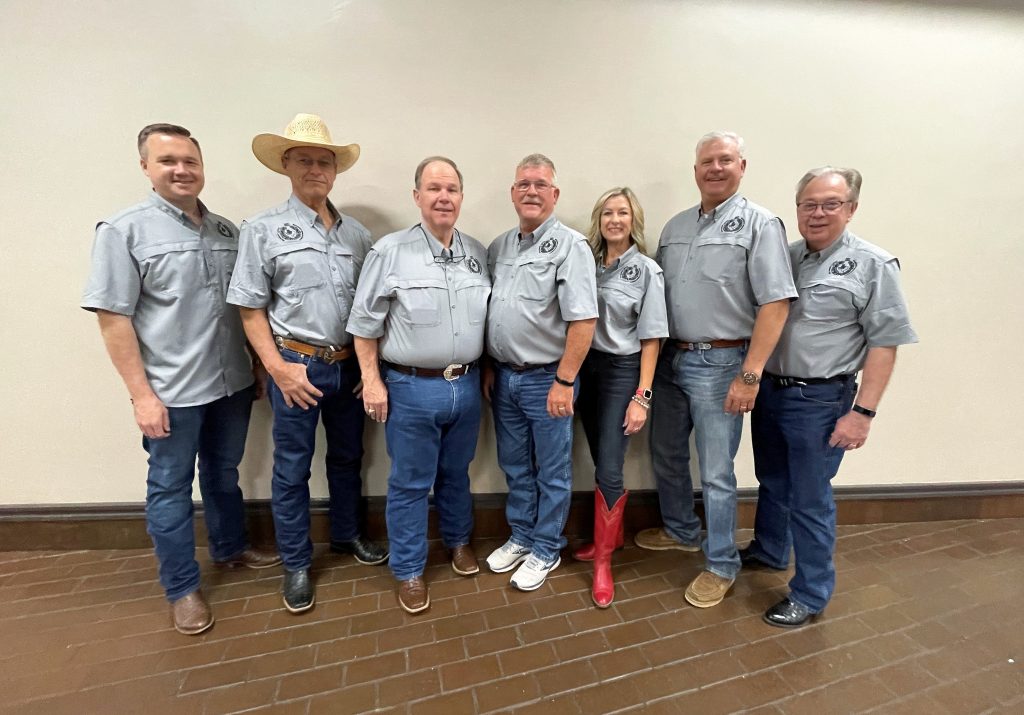Some 290 Commissioners Court members convened in Lubbock County April 25-28 for the 94th Annual Conference of the West Texas County Judges and Commissioners Association. The four-day meeting offered a wide range of coursework ranging from adopting the county budget, county road maintenance, and broadband communication to subdivision regulations, tax abatements, and working with the Texas Legislature. 
The classes, developed to help officials acquire their continuing education credits, were complemented by social and networking opportunities where Commissioners, Judges, spouses, exhibitors, and sponsors enjoyed fantastic food, fellowship, and entertainment.
On the third day of the conference, the membership unanimously passed 30 resolutions. The regional association resolutions are automatically considered by the State Association at the CJCAT annual conference. Once adopted by the State Association, the resolutions serve as the foundation for the CJCAT legislative platform.
Several of the courses offered in Lubbock were directly related to the resolutions passed by the West Texas Association, which now represents 119 counties following the addition of Gillespie County. For example, the Opening General Session included a class titled “Communications: Broadband.” Wise County Judge J.D. Clark and Floyd County Judge Marty Lucke, who have both served on broadband development councils, shared their perspectives and challenged the audience to be broadband champions.
 “As County Judges and County Commissioners, we need to be in that driver’s seat, pulling together interest groups and pulling together providers,” Clark emphasized. On a related note, officials need to keep apprised of the broadband components in the Farm Bill, currently up for reauthorization, Clark added.
“As County Judges and County Commissioners, we need to be in that driver’s seat, pulling together interest groups and pulling together providers,” Clark emphasized. On a related note, officials need to keep apprised of the broadband components in the Farm Bill, currently up for reauthorization, Clark added.
Later in the conference, the membership voted in favor of a resolution titled Texas Broadband Infrastructure Fund with the following concluding clause: “NOW, THEREFORE, BE IT RESOLVED that the West Texas County Judges and Commissioners Association, the state’s largest regional association of Commissioners Courts, encourages the Texas Legislature to support the creation and funding of the Texas Broadband Infrastructure Fund to truly connect every Texan to the promise and progress that broadband access delivers.”
During the Closing General Session, Lamb County Judge Mike DeLoach led a panel discussion on Fire and EMS Relations With the County Commissioners Court.
While fire response is considered an essential service, EMS is not, DeLoach shared, to the surprise of many in the audience.
Along with discussing the importance of providing EMS service, DeLoach encouraged communication and education between Commissioners Courts and first responders. 
“When you do a budget, who do you bring in to answer questions for you?” he asked. “When you have questions come up about fire and EMS, do you call them and have them come to court? Well, you should!”
Other panel members included a fire chief and EMS director who both work with Lamb County. The fire chief explained how he sends quarterly reports to Judge DeLoach to keep the court informed.
“You need to understand as a Commissioners Court that before you can fully assist fire and EMS, you need to understand what they are doing,” DeLoach elaborated. “So invite them to court. Read their reports!”
Once again, the topic corresponded with the resolutions document. The West Texas Resolutions Committee recommended two dozen issues for future study including the following: Support state funding for emergency medical services.
Finally, the conference closed with a session on Working With the Legislature.
State Sen. Charles Perry and State Sen. Kevin Sparks updated Commissioners Courts on issues before the 88th Texas Legislature including the status of the state budget.
On April 6, the Texas House of Representatives approved a historic $302.7 billion state spending plan with a vote of 136-10. On April 17, the Texas Senate approved a $308 billion spending plan for the next two years. Conferees from both chambers met publicly for the first time on April 25. Five representatives, led by House Appropriations Chair Rep. Greg Bonnen, and five senators, led by Senate Finance Committee Chair Sen. Joan Huffman, are tasked with resolving the differences in the two proposals.
The Senate proposal includes a significant increase in public education funding, Perry reported.
The Legislature is also looking at ways to fund more beds for juvenile offenders and for those with mental illness, Perry added.
“After developing the budget, the challenge then becomes deploying those funds efficiently and effectively,” Sparks stated.
Once again, the topics addressed by both Perry and Sparks were addressed generally or specifically in multiple West Texas Resolutions including approval of local option revenue sources and increases in mental health funding. For example, the resolution titled “Mental Health Patients ends as follows: “NOW, THEREFORE, BE IT RESOLVED that the West Texas County Judges and Commissioners Association hereby requests that the State of Texas implement additional funding for mental health services and implement the state mental health plan to ensure the efficient and effective use of these resources, and immediately reimburse counties for the cost of incarceration of offenders who have been committed to state facilities.”













